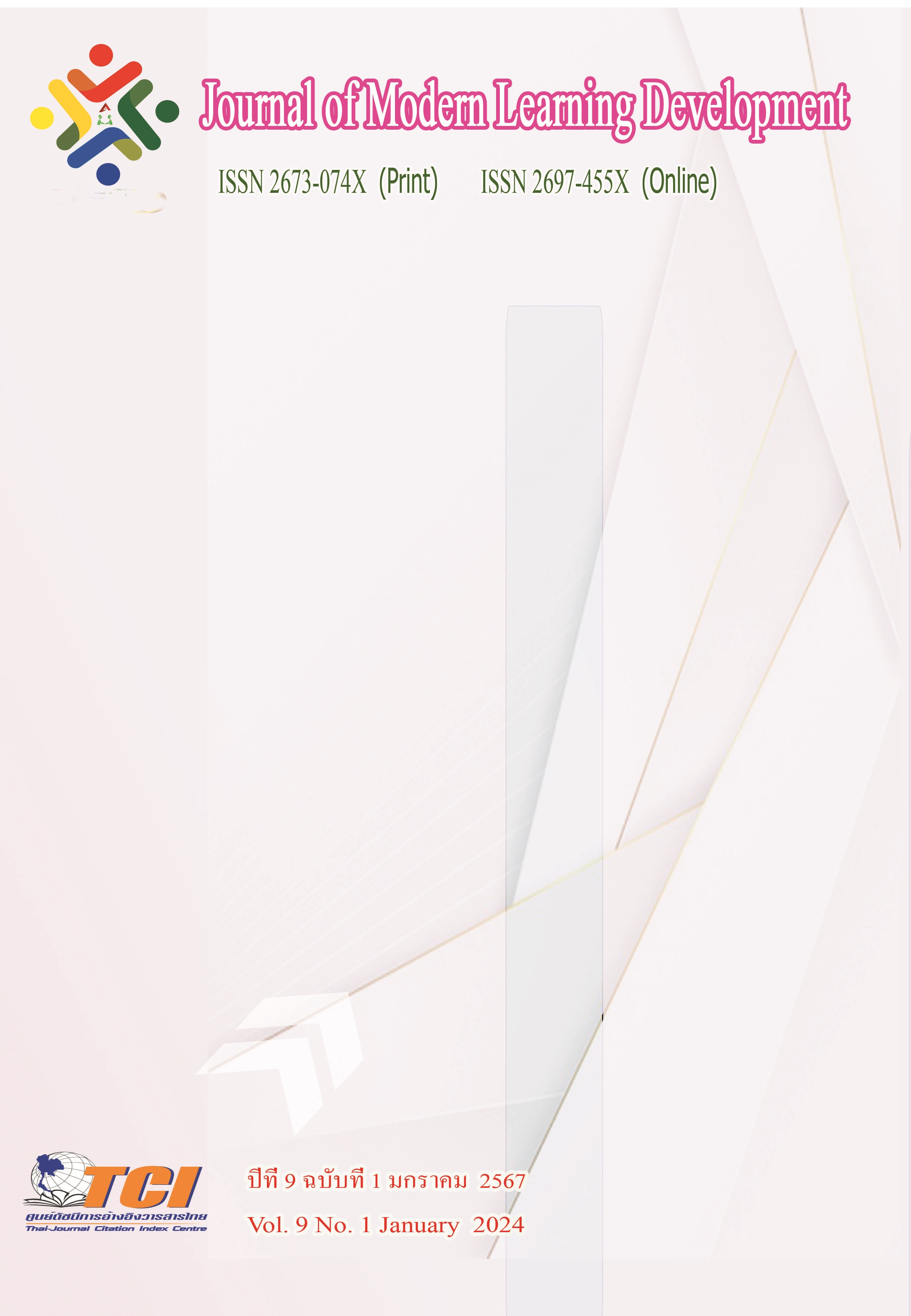อิทธิพลของปัจจัยเชิงสาเหตุต่อผลการดำเนินงานขององค์การในภาคเอกชน
Main Article Content
บทคัดย่อ
งานวิจัยนี้มีวัตถุประสงค์เพื่อ 1) ทดสอบอิทธิพลทางตรงปัจจัยเชิงสาเหตุต่อผลการดำเนินงานขององค์การในภาคเอกชน 2) ทดสอบอิทธิพลทางอ้อมปัจจัยเชิงสาเหตุต่อผลการดำเนินงานขององค์การในภาคเอกชนโดยส่งผ่านกลยุทธ์การจัดการทรัพยากรมนุษย์ เป็นการวิจัยเชิงปริมาณ โดยมีกลุ่มตัวอย่าง คือ ผู้ประกอบการด้านอุตสาหกรรมพลังงาน จำนวน 300 คน ใช้วิธีคัดเลือกด้วยการสุ่มแบบเจาะจงและการสุ่มแบบอย่างง่าย เครื่องมือวิจัยคือแบบสอบถาม โดยมีค่า IOC อยู่ที่ 0.95 วิเคราะห์ข้อมูลและประมวลผลด้วยการใช้สมการโครงสร้างเส้นทางกำลังสองน้อยที่สุดผ่านโปรแกรม Smart PLS
ผลการวิจัยตามวัตถุประสงค์ 1) ทดสอบอิทธิพลทางตรงปัจจัยเชิงสาเหตุต่อผลการดำเนินงานขององค์การในภาคเอกชน พบว่า ปัจจัยเชิงสาเหตุ ได้แก่ รูปแบบความเป็นผู้นำ ความผูกพันของพนักงาน และกลยุทธ์การจัดการทรัพยากรมนุษย์มีอิทธิพลทางตรงเชิงบวกต่อผลการดำเนินงานขององค์การในภาคเอกชน และยังพบว่ารูปแบบความเป็นผู้นำและความผูกพันของพนักงานมีอิทธิพลทางตรงเชิงบวกต่อกลยุทธ์การจัดการทรัพยากรมนุษย์ 2) ทดสอบอิทธิพลทางอ้อมปัจจัยเชิงสาเหตุต่อผลการดำเนินงานขององค์การในภาคเอกชนโดยส่งผ่านกลยุทธ์การจัดการทรัพยากรมนุษย์ พบว่า รูปแบบความเป็นผู้นำ ความผูกพันของพนักงานมีอิทธิพลทางอ้อมเชิงบวกต่อผลการดำเนินงานขององค์การในภาคเอกชนโดยส่งผ่านกลยุทธ์การจัดการทรัพยากรมนุษย์ซึ่งองค์การในภาคเอกชนสามารถนำองค์ความรู้/ข้อค้นพบจากงานวิจัยนี้ไปปรับใช้ประกอบการวางแผน กำหนดกลยุทธ์ในการปรับปรุง พัฒนา ส่งเสริมและต่อยอดให้ผลการดำเนินงานขององค์การดีขึ้นอย่างต่อเนื่อง เป็นประโยชน์ในการแข่งขันเชิงธุรกิจต่อไป
Article Details
เอกสารอ้างอิง
Allen, N. J., & Meyer, J. P. (1990). The measurement and antecedents of affective, continuance and normative commitment to the organization. Journal of Occupational Psychology, 63 (1), 1-18.
Andrew, A. (2017). Employees’ Commitment and Its Impact on Organizational Performance. Asian Journal of Economics, Business and Accounting, 5 (2), 1-13.
Aktar, S. (2012). The Impact of rewards on employee performance in commercial banks of Bangladesh: An empirical study. IOSR Journal of Business and Management, 6 (2), 9–15.
Arif, S. and Akram, A. (2018). Transformational Leadership and Organizational Performance. Seisense Journal of Management, 1 (3), 59-67.
Bejinariu, A.C., Jitarel, A., Sarca, I., & Mocan, A. (2017). Organizational change management-concepts definitions and approaches inventory. In Management Challenges in a Network Economy: Proceedings of the Make Learn and TIIM International Conference, 321-330.
Biljana, D., Maja, I.D., Vinko, L. and Sandra, M. (2020). The impact of employees' commitment on organizational performances. Strategic Management, 25 (3), 028-037.
Campbell, J. P. (1977). On the nature of organizational effectiveness. In P. S. Goodman, J. M. Pennings & Associates (Eds.), New perspectives on organizational effectiveness, 13–55.
Decker, P., Durand, R., Mayfield, C. O., McCormack, C., Skinner, D., & Perdue, G. (2012). Predicting implementation failure in organization change. Journal of Organizational Culture, Communication and Conflict, 16 (2), 29–49.
Dina, L. and Alina, L. (2020). The Impact of Transformational Leadership on Organizational Effectiveness. online. From link: https://www.researchgate.net/profile/Dina-Lut/ publication/341267219.pdf
Deeprose, D. (1994). How to Recognize and Reward Employees. AMACOM, New York.
Ehijiele, E. (2019). The Influence of Employees’ Commitment on Organizational Performance in Nigeria. online. From link:https://www.researchgate.net/publication/334560138
Energy Policy and Planning Office (EPPO). (2022). ANNUAL REPORT 2022. online. From link:https://www.eppo.go.th/images/Infromation_service/EppoAnnualReport/EppoAnnualReport2022.pdf
Greenleaf, R. K. (1970). The servant as leader. Robert K. Greenleaf Publishing Center. Journal of Leadership, 2 (4), 00.
Herlina et al. (2022). Strategic Human Resources Management Practices and Employee Commitment: Literature Review. Budapest International Research and Critics Institute-Journal, 5 (2), 14454-14461.
Huang, L.S. (2006). Transformational leadership has effect on organizational performance: the organizational culture as an intermediary variable. Unpublished master's thesis, National Taipei University, Taipei, Taiwan.
Hughes, M. (2011). Do 70 per cent of all organizational change initiatives really fail. Journal of Change Management, 11 (4), 451–464.
Lopez-Cabrales, A., Bornay-Barrachina, M. and Diaz-Fernandez, M. (2017). Leadership and Dynamic Capabilities: The Role of HR Systems. Personnel Review, 46 (2), 255–276.
Irefin, P. and Mechanic, M. A. (2014). Effect of Employee Commitment on Organizational Performance in Coca Cola Nigeria Limited Maiduguri, Borno State. IOSR Journal of Humanities and Social Science (IOSR-JHSS), 19 (3), 33-41.
Karl, K. W., and Lewis, P. (1987). Transactional and transformational leadership: A constructive/developmental analysis. The Academy of Management Review, 12 (4), 648–657.
Markos, S., & Sridevi, M. S. (2010) Employee engagement: The key to improving performance. International Journal of Business and Management, 5, 89–96.
Meyer, J. P., & Allen, N. J. (1997). Commitment in the Workplace: Theory, Research and
Application. Thousand Oaks, California: Sage.
Onyango, T. O. (2012). The influence of training and development on employees performance at Mudete tea factory. International Journal of Scientific Research and Management, 6 (3), 191–198.
Princy, K. and Rebeka, E. (2019). Employee Commitment on Organizational Performance. International Journal of Recent Technology and Engineering, 8 (3), 891-894.
Sanyal, S., & Hisam, M. W. (2018). Impact of training and development on the performance of employees-A comparative study on select banks in sultanate of Oman. International Journal of Scientific Research and Management, 6 (03), 191–198.
Schuler, R.S. (1989). Strategic human resource management and industrial relations. Hum Relat., 42 (2), 157-184.
Sirisak, P. (2016). Impact of Transformational Leadership, Organizational Creativity and
Organizational Innovation on SMEs Performance in Thailand. Academic Services Journal, Prince of Songkla University, 27 (3), 11-23.
Timoti, K. (2020). Employee Commitment On Organizational Performance: A Review Of Literature. online. From link: https://www.researchgate.net/publication/346425419.
Wan, D., Kok, V., & Hong, C. H. (2002). Strategic human resource management and organizational performance in Singapore, Compensation and benefits. Review Saranac, 39 (4), 836–866.
Yang, Y. S., & Kim, D. H. (2013). Nurses' professionalism and job satisfaction on the level of delegation of nursing activities in long-term care hospitals. Journal of Korean Gerontological Nursing, 15 (2), 175–84.
Zainon et al. (2020). Factors of Human Resource Management Practices Affecting Organizational Performance. International Journal of Organizational Leadership, 9, 184-197.


